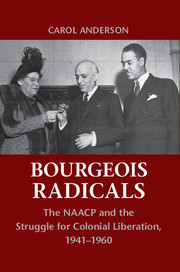Book contents
- Frontmatter
- Dedication
- Contents
- List of Figures
- Acknowledgments
- Introduction De-Centering Du Bois
- 1 Rising Wind
- 2 “The White Man’s Burden Has Not Been Very Heavy”
- 3 “An Even Larger Issue Than ‘Containing Communism’”
- 4 So Weak, So Seventeenth Century
- 5 Regime Change
- Conclusion Beyond the Single Story
- Bibliography
- Index
- References
2 - “The White Man’s Burden Has Not Been Very Heavy”
The NAACP’s Anticolonial Struggle against South Africa, 1946–1951
Published online by Cambridge University Press: 05 December 2014
- Frontmatter
- Dedication
- Contents
- List of Figures
- Acknowledgments
- Introduction De-Centering Du Bois
- 1 Rising Wind
- 2 “The White Man’s Burden Has Not Been Very Heavy”
- 3 “An Even Larger Issue Than ‘Containing Communism’”
- 4 So Weak, So Seventeenth Century
- 5 Regime Change
- Conclusion Beyond the Single Story
- Bibliography
- Index
- References
Summary
No country like the Union of South Africa can be recognized as capable of exercising a colonial mandate.
– NAACP Colonial Conference, 1945The NAACP’s postwar agenda was firmly established at the April 1945 Colonial Conference. That meeting, in many ways, generated the Association’s road map to colonial liberation: South Africa (South West Africa); Italy (Libya, Eritrea, Somalia); the Netherlands (Indonesia); France (Morocco and Tunisia); and Britain (Kenya). With a strategy similar to the methodical case-by-case approach it had used to expose the sham of separate but equal, the NAACP recognized that the way each colony was governed presented a prime opportunity to strategically undermine and delegitimize the rationales that had, for too long, transformed the brutality of white supremacy into the narrative of benevolent colonial rule.
South West Africa (current day Namibia), in particular, was a testament to how far the myth of the “white man’s burden” had fallen short. The colony had been a mandate under the old League of Nations system and, as such, was a “sacred trust of civilization” administered, in this case, by South Africa. That jarring juxtaposition – a sacred trust held by a racially repressive regime – led the NAACP to emphasize two key principles that were essential for challenging the viability of colonialism in a world birthed by the Atlantic and UN Charters.
- Type
- Chapter
- Information
- Bourgeois RadicalsThe NAACP and the Struggle for Colonial Liberation, 1941–1960, pp. 69 - 132Publisher: Cambridge University PressPrint publication year: 2014



